History of Africa: Causes, Impacts, and British Influence in Egypt
VerifiedAdded on 2022/08/27
|17
|4485
|17
Essay
AI Summary
This essay delves into the history of British involvement in Egypt, starting from the early 19th century and the growing influence of European powers. It focuses on the Anglo-Egyptian War, analyzing its causes, impacts, and the broader influences of British colonialism. The paper examines the significance of the Suez Canal, the British desire for control, and the economic and political consequences of British rule. It also explores the role of the Nile River, the water crisis of the 1890s, and how these factors shaped British dominance. The essay highlights key events, including the British invasion and occupation, the strategic importance of the Suez Canal, and the lasting impact of British policies on Egypt's economy and society. The essay also examines the historical context of the British influence in Egypt, including the interactions between Egypt and European powers, the rise and fall of different empires, and the impact of these events on the political and economic landscape of Egypt. The paper concludes with a reflection on the lasting consequences of British colonialism in Egypt, including its effects on Egyptian society, culture, and its relationship with the rest of the world.
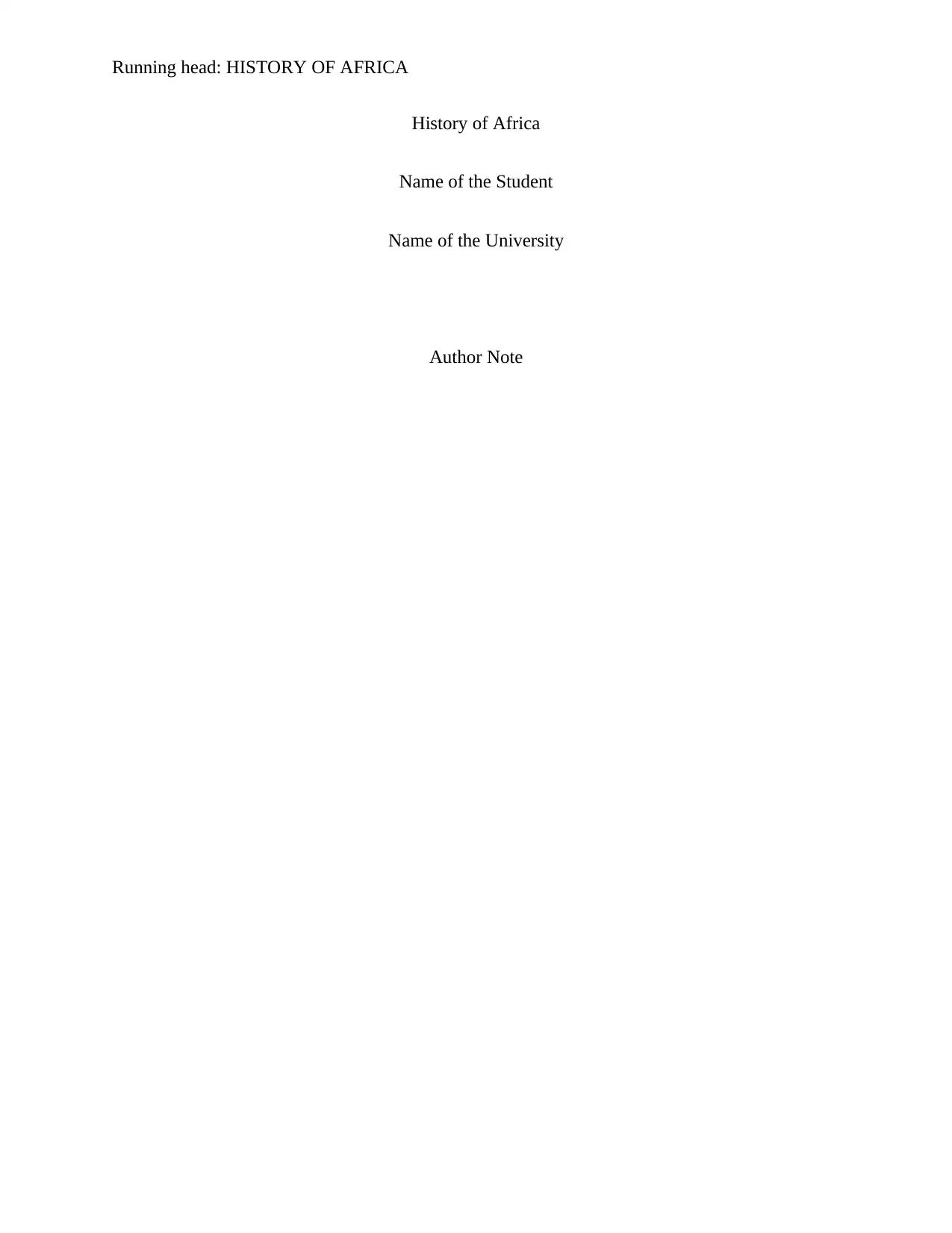
Running head: HISTORY OF AFRICA
History of Africa
Name of the Student
Name of the University
Author Note
History of Africa
Name of the Student
Name of the University
Author Note
Paraphrase This Document
Need a fresh take? Get an instant paraphrase of this document with our AI Paraphraser
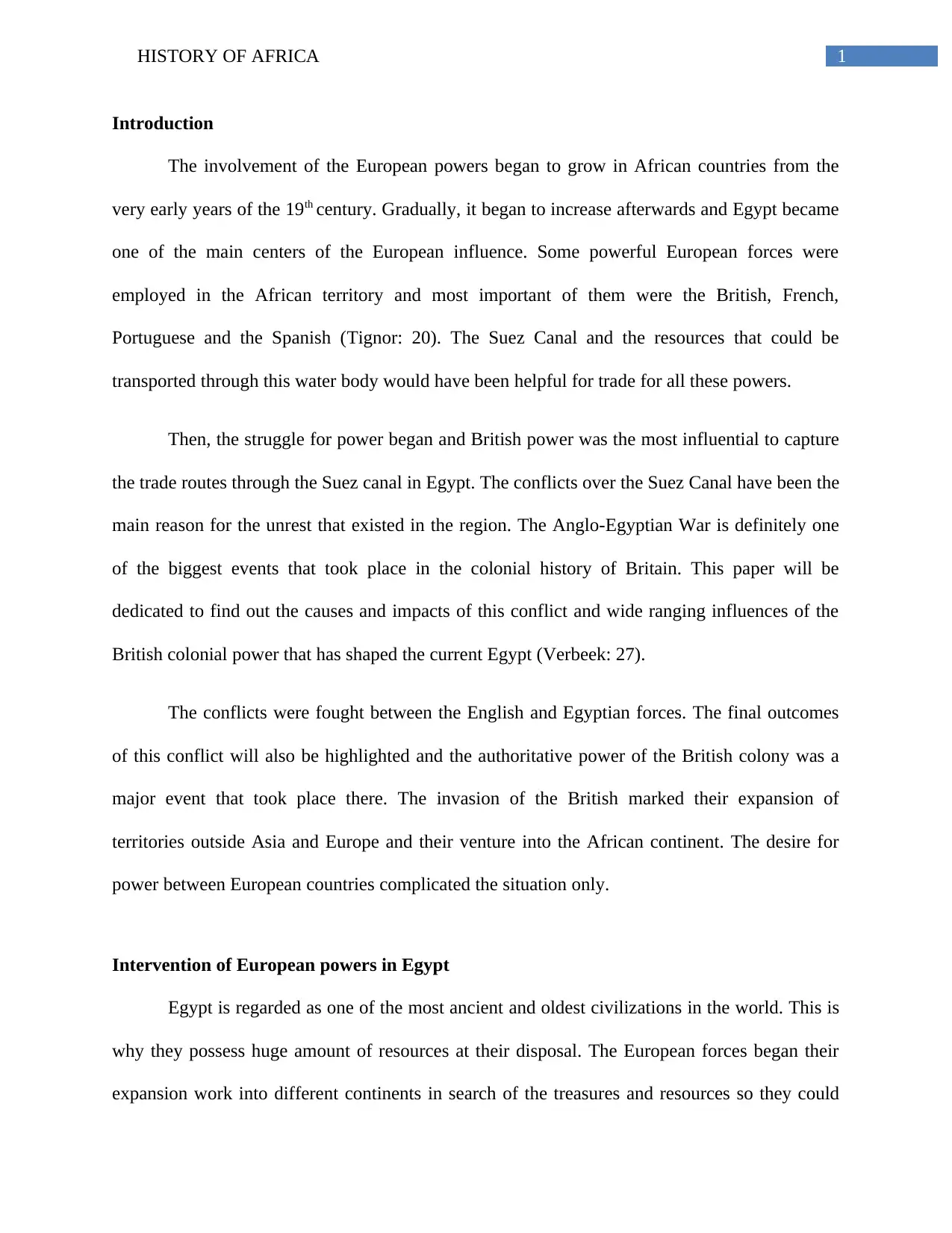
1HISTORY OF AFRICA
Introduction
The involvement of the European powers began to grow in African countries from the
very early years of the 19th century. Gradually, it began to increase afterwards and Egypt became
one of the main centers of the European influence. Some powerful European forces were
employed in the African territory and most important of them were the British, French,
Portuguese and the Spanish (Tignor: 20). The Suez Canal and the resources that could be
transported through this water body would have been helpful for trade for all these powers.
Then, the struggle for power began and British power was the most influential to capture
the trade routes through the Suez canal in Egypt. The conflicts over the Suez Canal have been the
main reason for the unrest that existed in the region. The Anglo-Egyptian War is definitely one
of the biggest events that took place in the colonial history of Britain. This paper will be
dedicated to find out the causes and impacts of this conflict and wide ranging influences of the
British colonial power that has shaped the current Egypt (Verbeek: 27).
The conflicts were fought between the English and Egyptian forces. The final outcomes
of this conflict will also be highlighted and the authoritative power of the British colony was a
major event that took place there. The invasion of the British marked their expansion of
territories outside Asia and Europe and their venture into the African continent. The desire for
power between European countries complicated the situation only.
Intervention of European powers in Egypt
Egypt is regarded as one of the most ancient and oldest civilizations in the world. This is
why they possess huge amount of resources at their disposal. The European forces began their
expansion work into different continents in search of the treasures and resources so they could
Introduction
The involvement of the European powers began to grow in African countries from the
very early years of the 19th century. Gradually, it began to increase afterwards and Egypt became
one of the main centers of the European influence. Some powerful European forces were
employed in the African territory and most important of them were the British, French,
Portuguese and the Spanish (Tignor: 20). The Suez Canal and the resources that could be
transported through this water body would have been helpful for trade for all these powers.
Then, the struggle for power began and British power was the most influential to capture
the trade routes through the Suez canal in Egypt. The conflicts over the Suez Canal have been the
main reason for the unrest that existed in the region. The Anglo-Egyptian War is definitely one
of the biggest events that took place in the colonial history of Britain. This paper will be
dedicated to find out the causes and impacts of this conflict and wide ranging influences of the
British colonial power that has shaped the current Egypt (Verbeek: 27).
The conflicts were fought between the English and Egyptian forces. The final outcomes
of this conflict will also be highlighted and the authoritative power of the British colony was a
major event that took place there. The invasion of the British marked their expansion of
territories outside Asia and Europe and their venture into the African continent. The desire for
power between European countries complicated the situation only.
Intervention of European powers in Egypt
Egypt is regarded as one of the most ancient and oldest civilizations in the world. This is
why they possess huge amount of resources at their disposal. The European forces began their
expansion work into different continents in search of the treasures and resources so they could
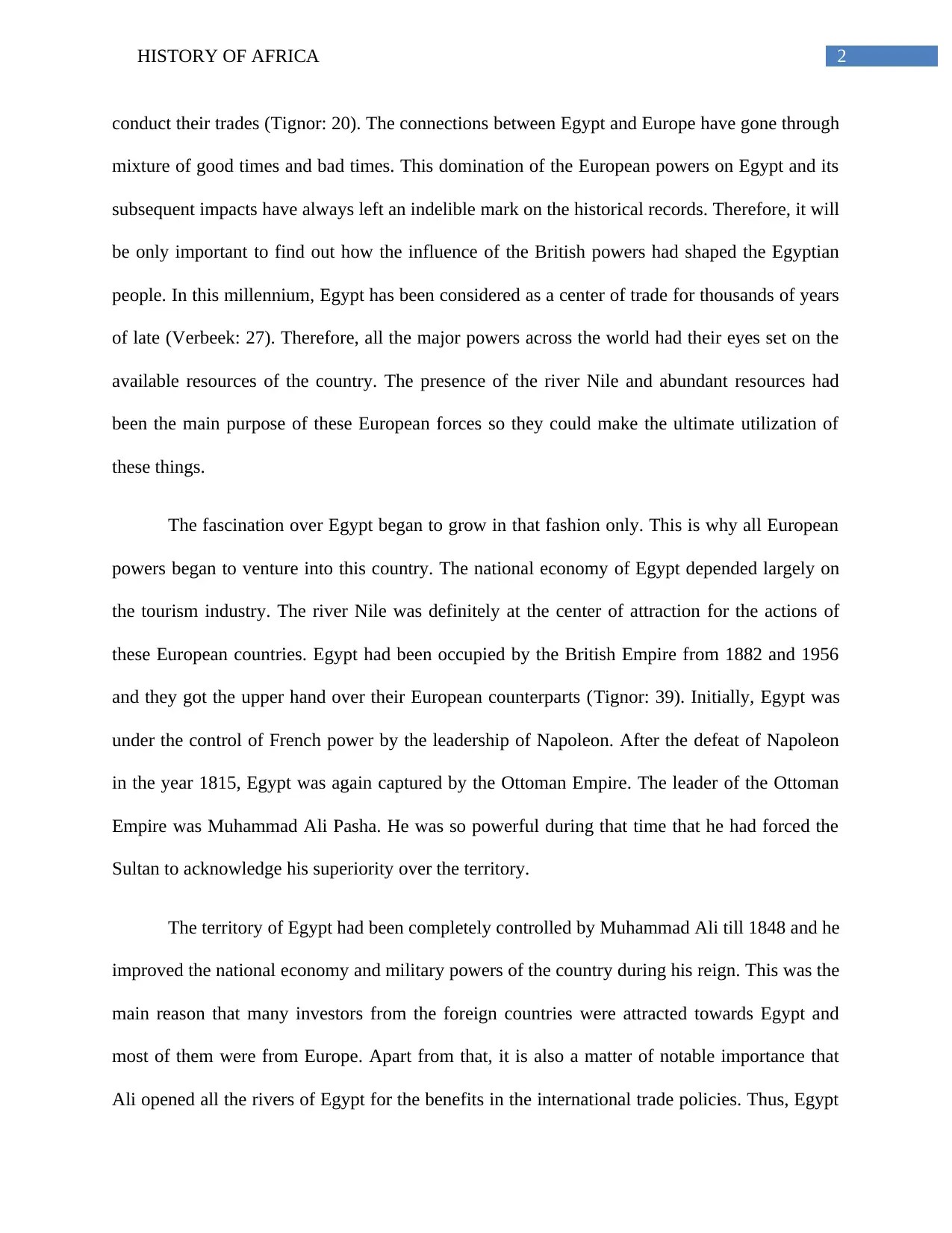
2HISTORY OF AFRICA
conduct their trades (Tignor: 20). The connections between Egypt and Europe have gone through
mixture of good times and bad times. This domination of the European powers on Egypt and its
subsequent impacts have always left an indelible mark on the historical records. Therefore, it will
be only important to find out how the influence of the British powers had shaped the Egyptian
people. In this millennium, Egypt has been considered as a center of trade for thousands of years
of late (Verbeek: 27). Therefore, all the major powers across the world had their eyes set on the
available resources of the country. The presence of the river Nile and abundant resources had
been the main purpose of these European forces so they could make the ultimate utilization of
these things.
The fascination over Egypt began to grow in that fashion only. This is why all European
powers began to venture into this country. The national economy of Egypt depended largely on
the tourism industry. The river Nile was definitely at the center of attraction for the actions of
these European countries. Egypt had been occupied by the British Empire from 1882 and 1956
and they got the upper hand over their European counterparts (Tignor: 39). Initially, Egypt was
under the control of French power by the leadership of Napoleon. After the defeat of Napoleon
in the year 1815, Egypt was again captured by the Ottoman Empire. The leader of the Ottoman
Empire was Muhammad Ali Pasha. He was so powerful during that time that he had forced the
Sultan to acknowledge his superiority over the territory.
The territory of Egypt had been completely controlled by Muhammad Ali till 1848 and he
improved the national economy and military powers of the country during his reign. This was the
main reason that many investors from the foreign countries were attracted towards Egypt and
most of them were from Europe. Apart from that, it is also a matter of notable importance that
Ali opened all the rivers of Egypt for the benefits in the international trade policies. Thus, Egypt
conduct their trades (Tignor: 20). The connections between Egypt and Europe have gone through
mixture of good times and bad times. This domination of the European powers on Egypt and its
subsequent impacts have always left an indelible mark on the historical records. Therefore, it will
be only important to find out how the influence of the British powers had shaped the Egyptian
people. In this millennium, Egypt has been considered as a center of trade for thousands of years
of late (Verbeek: 27). Therefore, all the major powers across the world had their eyes set on the
available resources of the country. The presence of the river Nile and abundant resources had
been the main purpose of these European forces so they could make the ultimate utilization of
these things.
The fascination over Egypt began to grow in that fashion only. This is why all European
powers began to venture into this country. The national economy of Egypt depended largely on
the tourism industry. The river Nile was definitely at the center of attraction for the actions of
these European countries. Egypt had been occupied by the British Empire from 1882 and 1956
and they got the upper hand over their European counterparts (Tignor: 39). Initially, Egypt was
under the control of French power by the leadership of Napoleon. After the defeat of Napoleon
in the year 1815, Egypt was again captured by the Ottoman Empire. The leader of the Ottoman
Empire was Muhammad Ali Pasha. He was so powerful during that time that he had forced the
Sultan to acknowledge his superiority over the territory.
The territory of Egypt had been completely controlled by Muhammad Ali till 1848 and he
improved the national economy and military powers of the country during his reign. This was the
main reason that many investors from the foreign countries were attracted towards Egypt and
most of them were from Europe. Apart from that, it is also a matter of notable importance that
Ali opened all the rivers of Egypt for the benefits in the international trade policies. Thus, Egypt
⊘ This is a preview!⊘
Do you want full access?
Subscribe today to unlock all pages.

Trusted by 1+ million students worldwide
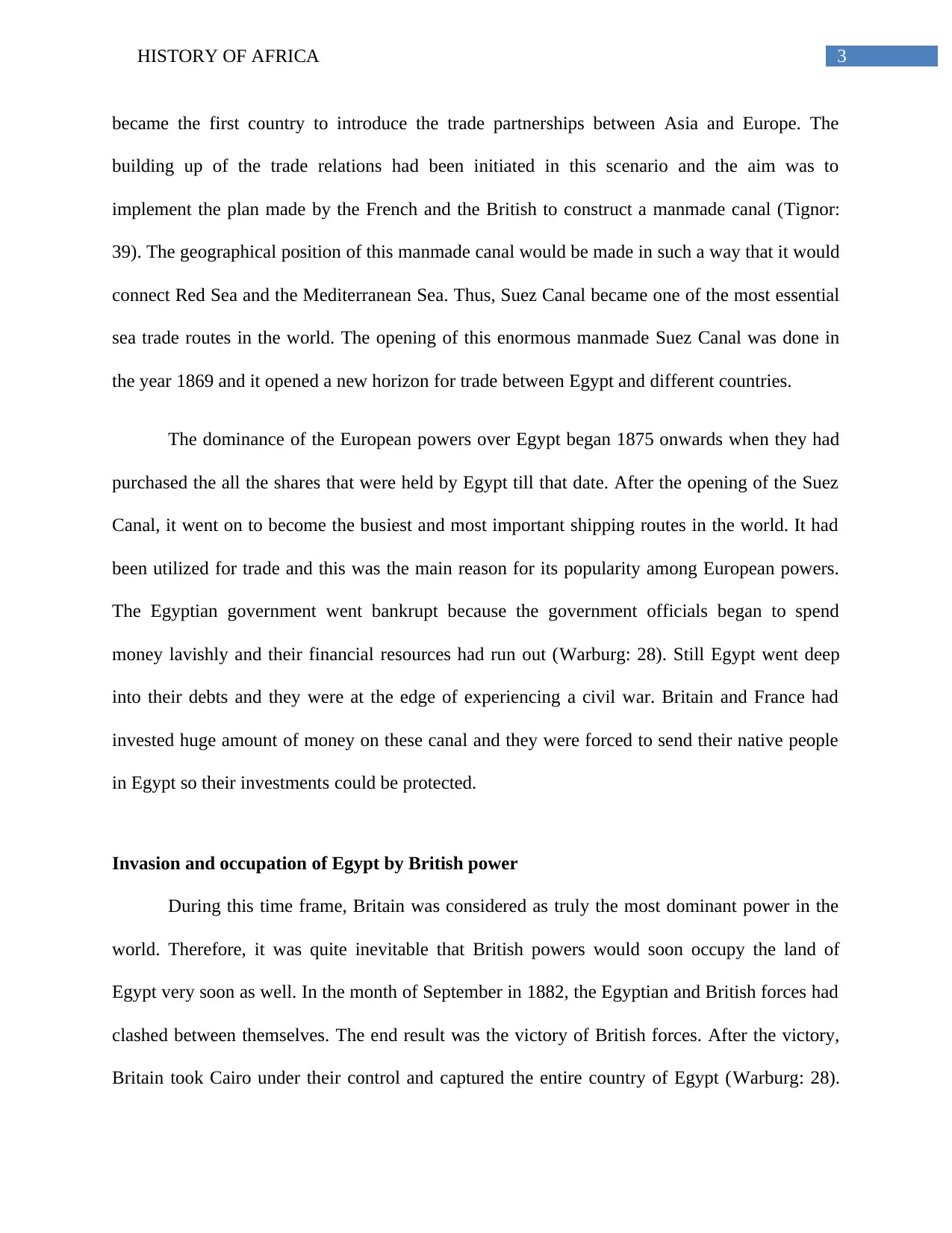
3HISTORY OF AFRICA
became the first country to introduce the trade partnerships between Asia and Europe. The
building up of the trade relations had been initiated in this scenario and the aim was to
implement the plan made by the French and the British to construct a manmade canal (Tignor:
39). The geographical position of this manmade canal would be made in such a way that it would
connect Red Sea and the Mediterranean Sea. Thus, Suez Canal became one of the most essential
sea trade routes in the world. The opening of this enormous manmade Suez Canal was done in
the year 1869 and it opened a new horizon for trade between Egypt and different countries.
The dominance of the European powers over Egypt began 1875 onwards when they had
purchased the all the shares that were held by Egypt till that date. After the opening of the Suez
Canal, it went on to become the busiest and most important shipping routes in the world. It had
been utilized for trade and this was the main reason for its popularity among European powers.
The Egyptian government went bankrupt because the government officials began to spend
money lavishly and their financial resources had run out (Warburg: 28). Still Egypt went deep
into their debts and they were at the edge of experiencing a civil war. Britain and France had
invested huge amount of money on these canal and they were forced to send their native people
in Egypt so their investments could be protected.
Invasion and occupation of Egypt by British power
During this time frame, Britain was considered as truly the most dominant power in the
world. Therefore, it was quite inevitable that British powers would soon occupy the land of
Egypt very soon as well. In the month of September in 1882, the Egyptian and British forces had
clashed between themselves. The end result was the victory of British forces. After the victory,
Britain took Cairo under their control and captured the entire country of Egypt (Warburg: 28).
became the first country to introduce the trade partnerships between Asia and Europe. The
building up of the trade relations had been initiated in this scenario and the aim was to
implement the plan made by the French and the British to construct a manmade canal (Tignor:
39). The geographical position of this manmade canal would be made in such a way that it would
connect Red Sea and the Mediterranean Sea. Thus, Suez Canal became one of the most essential
sea trade routes in the world. The opening of this enormous manmade Suez Canal was done in
the year 1869 and it opened a new horizon for trade between Egypt and different countries.
The dominance of the European powers over Egypt began 1875 onwards when they had
purchased the all the shares that were held by Egypt till that date. After the opening of the Suez
Canal, it went on to become the busiest and most important shipping routes in the world. It had
been utilized for trade and this was the main reason for its popularity among European powers.
The Egyptian government went bankrupt because the government officials began to spend
money lavishly and their financial resources had run out (Warburg: 28). Still Egypt went deep
into their debts and they were at the edge of experiencing a civil war. Britain and France had
invested huge amount of money on these canal and they were forced to send their native people
in Egypt so their investments could be protected.
Invasion and occupation of Egypt by British power
During this time frame, Britain was considered as truly the most dominant power in the
world. Therefore, it was quite inevitable that British powers would soon occupy the land of
Egypt very soon as well. In the month of September in 1882, the Egyptian and British forces had
clashed between themselves. The end result was the victory of British forces. After the victory,
Britain took Cairo under their control and captured the entire country of Egypt (Warburg: 28).
Paraphrase This Document
Need a fresh take? Get an instant paraphrase of this document with our AI Paraphraser
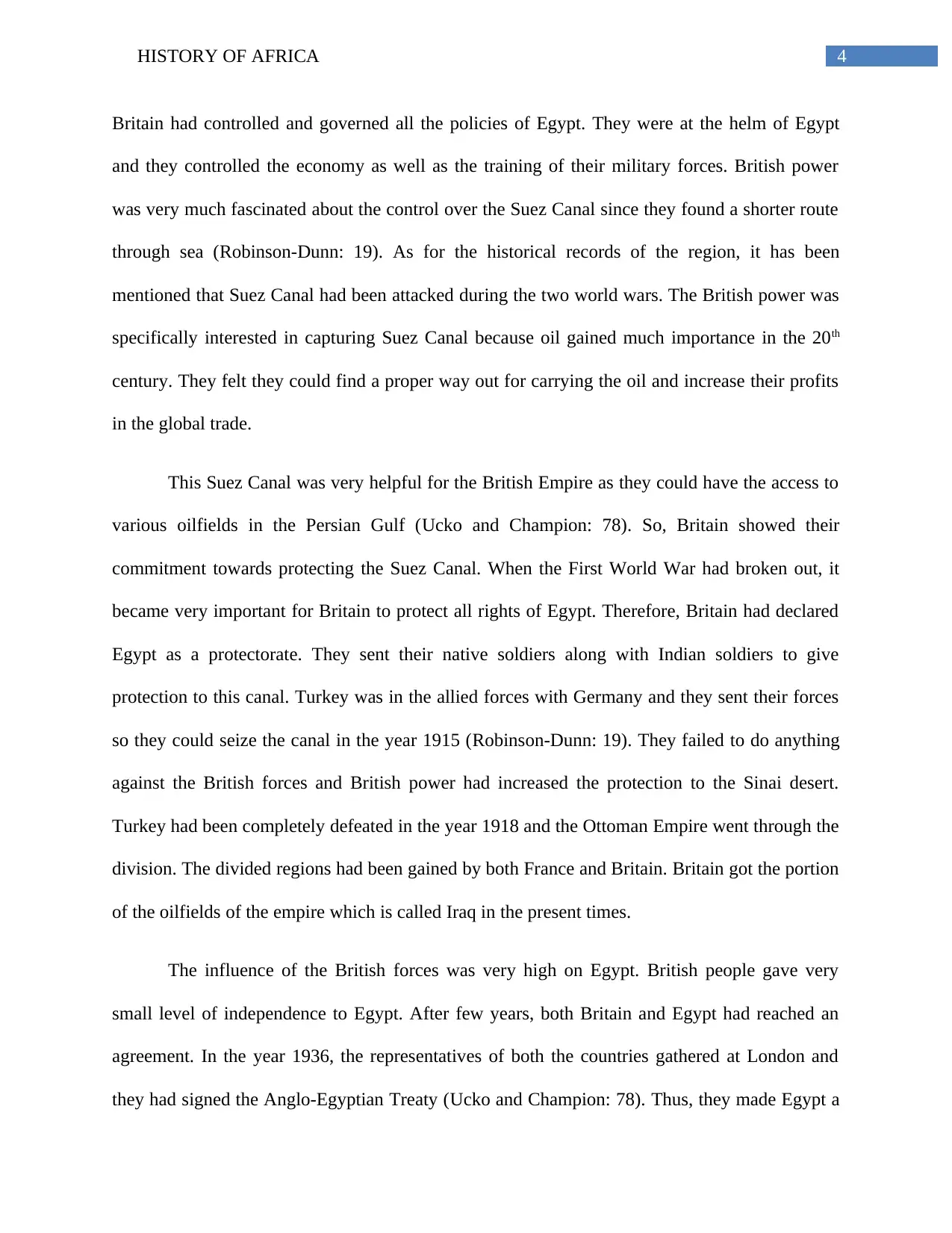
4HISTORY OF AFRICA
Britain had controlled and governed all the policies of Egypt. They were at the helm of Egypt
and they controlled the economy as well as the training of their military forces. British power
was very much fascinated about the control over the Suez Canal since they found a shorter route
through sea (Robinson-Dunn: 19). As for the historical records of the region, it has been
mentioned that Suez Canal had been attacked during the two world wars. The British power was
specifically interested in capturing Suez Canal because oil gained much importance in the 20th
century. They felt they could find a proper way out for carrying the oil and increase their profits
in the global trade.
This Suez Canal was very helpful for the British Empire as they could have the access to
various oilfields in the Persian Gulf (Ucko and Champion: 78). So, Britain showed their
commitment towards protecting the Suez Canal. When the First World War had broken out, it
became very important for Britain to protect all rights of Egypt. Therefore, Britain had declared
Egypt as a protectorate. They sent their native soldiers along with Indian soldiers to give
protection to this canal. Turkey was in the allied forces with Germany and they sent their forces
so they could seize the canal in the year 1915 (Robinson-Dunn: 19). They failed to do anything
against the British forces and British power had increased the protection to the Sinai desert.
Turkey had been completely defeated in the year 1918 and the Ottoman Empire went through the
division. The divided regions had been gained by both France and Britain. Britain got the portion
of the oilfields of the empire which is called Iraq in the present times.
The influence of the British forces was very high on Egypt. British people gave very
small level of independence to Egypt. After few years, both Britain and Egypt had reached an
agreement. In the year 1936, the representatives of both the countries gathered at London and
they had signed the Anglo-Egyptian Treaty (Ucko and Champion: 78). Thus, they made Egypt a
Britain had controlled and governed all the policies of Egypt. They were at the helm of Egypt
and they controlled the economy as well as the training of their military forces. British power
was very much fascinated about the control over the Suez Canal since they found a shorter route
through sea (Robinson-Dunn: 19). As for the historical records of the region, it has been
mentioned that Suez Canal had been attacked during the two world wars. The British power was
specifically interested in capturing Suez Canal because oil gained much importance in the 20th
century. They felt they could find a proper way out for carrying the oil and increase their profits
in the global trade.
This Suez Canal was very helpful for the British Empire as they could have the access to
various oilfields in the Persian Gulf (Ucko and Champion: 78). So, Britain showed their
commitment towards protecting the Suez Canal. When the First World War had broken out, it
became very important for Britain to protect all rights of Egypt. Therefore, Britain had declared
Egypt as a protectorate. They sent their native soldiers along with Indian soldiers to give
protection to this canal. Turkey was in the allied forces with Germany and they sent their forces
so they could seize the canal in the year 1915 (Robinson-Dunn: 19). They failed to do anything
against the British forces and British power had increased the protection to the Sinai desert.
Turkey had been completely defeated in the year 1918 and the Ottoman Empire went through the
division. The divided regions had been gained by both France and Britain. Britain got the portion
of the oilfields of the empire which is called Iraq in the present times.
The influence of the British forces was very high on Egypt. British people gave very
small level of independence to Egypt. After few years, both Britain and Egypt had reached an
agreement. In the year 1936, the representatives of both the countries gathered at London and
they had signed the Anglo-Egyptian Treaty (Ucko and Champion: 78). Thus, they made Egypt a
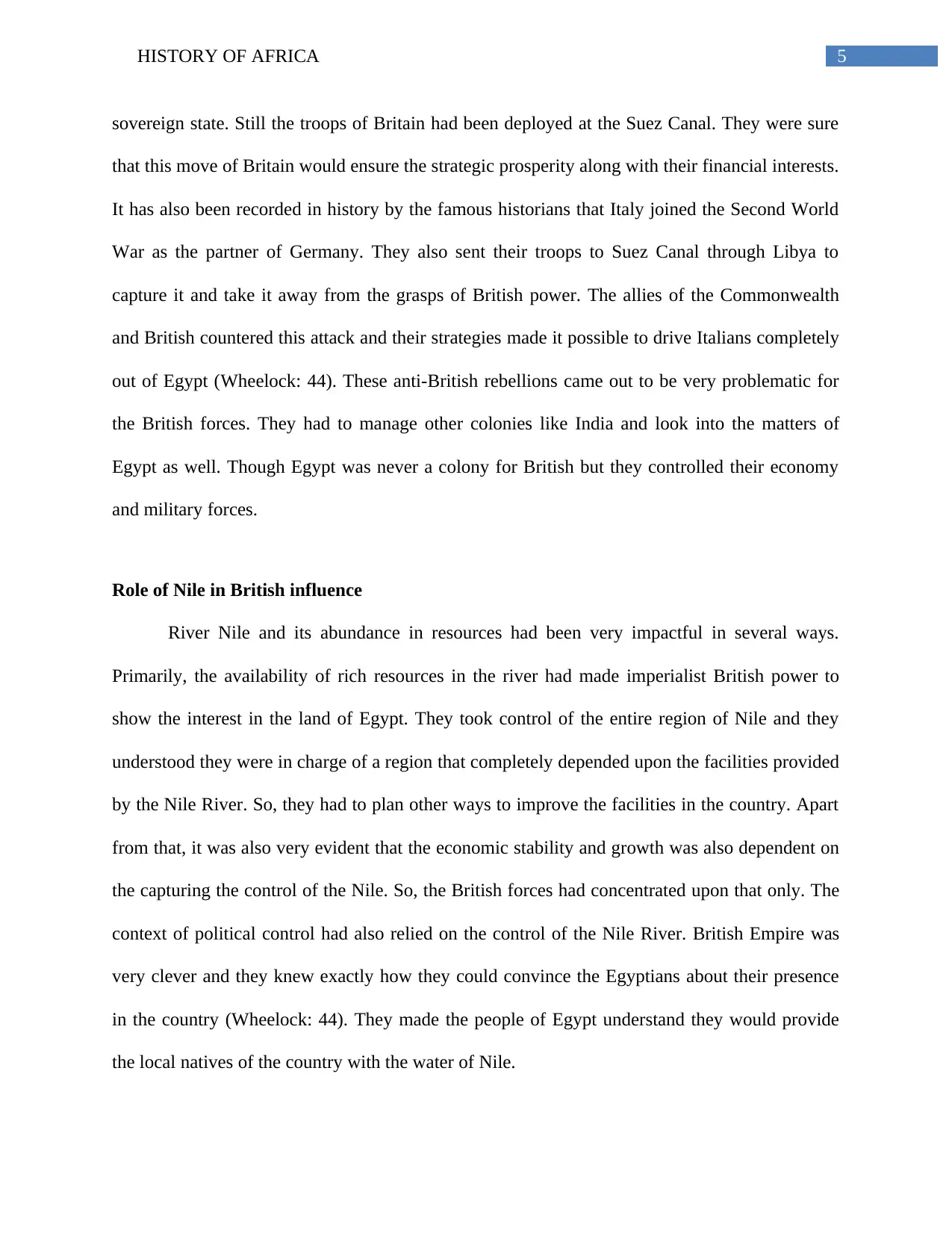
5HISTORY OF AFRICA
sovereign state. Still the troops of Britain had been deployed at the Suez Canal. They were sure
that this move of Britain would ensure the strategic prosperity along with their financial interests.
It has also been recorded in history by the famous historians that Italy joined the Second World
War as the partner of Germany. They also sent their troops to Suez Canal through Libya to
capture it and take it away from the grasps of British power. The allies of the Commonwealth
and British countered this attack and their strategies made it possible to drive Italians completely
out of Egypt (Wheelock: 44). These anti-British rebellions came out to be very problematic for
the British forces. They had to manage other colonies like India and look into the matters of
Egypt as well. Though Egypt was never a colony for British but they controlled their economy
and military forces.
Role of Nile in British influence
River Nile and its abundance in resources had been very impactful in several ways.
Primarily, the availability of rich resources in the river had made imperialist British power to
show the interest in the land of Egypt. They took control of the entire region of Nile and they
understood they were in charge of a region that completely depended upon the facilities provided
by the Nile River. So, they had to plan other ways to improve the facilities in the country. Apart
from that, it was also very evident that the economic stability and growth was also dependent on
the capturing the control of the Nile. So, the British forces had concentrated upon that only. The
context of political control had also relied on the control of the Nile River. British Empire was
very clever and they knew exactly how they could convince the Egyptians about their presence
in the country (Wheelock: 44). They made the people of Egypt understand they would provide
the local natives of the country with the water of Nile.
sovereign state. Still the troops of Britain had been deployed at the Suez Canal. They were sure
that this move of Britain would ensure the strategic prosperity along with their financial interests.
It has also been recorded in history by the famous historians that Italy joined the Second World
War as the partner of Germany. They also sent their troops to Suez Canal through Libya to
capture it and take it away from the grasps of British power. The allies of the Commonwealth
and British countered this attack and their strategies made it possible to drive Italians completely
out of Egypt (Wheelock: 44). These anti-British rebellions came out to be very problematic for
the British forces. They had to manage other colonies like India and look into the matters of
Egypt as well. Though Egypt was never a colony for British but they controlled their economy
and military forces.
Role of Nile in British influence
River Nile and its abundance in resources had been very impactful in several ways.
Primarily, the availability of rich resources in the river had made imperialist British power to
show the interest in the land of Egypt. They took control of the entire region of Nile and they
understood they were in charge of a region that completely depended upon the facilities provided
by the Nile River. So, they had to plan other ways to improve the facilities in the country. Apart
from that, it was also very evident that the economic stability and growth was also dependent on
the capturing the control of the Nile. So, the British forces had concentrated upon that only. The
context of political control had also relied on the control of the Nile River. British Empire was
very clever and they knew exactly how they could convince the Egyptians about their presence
in the country (Wheelock: 44). They made the people of Egypt understand they would provide
the local natives of the country with the water of Nile.
⊘ This is a preview!⊘
Do you want full access?
Subscribe today to unlock all pages.

Trusted by 1+ million students worldwide
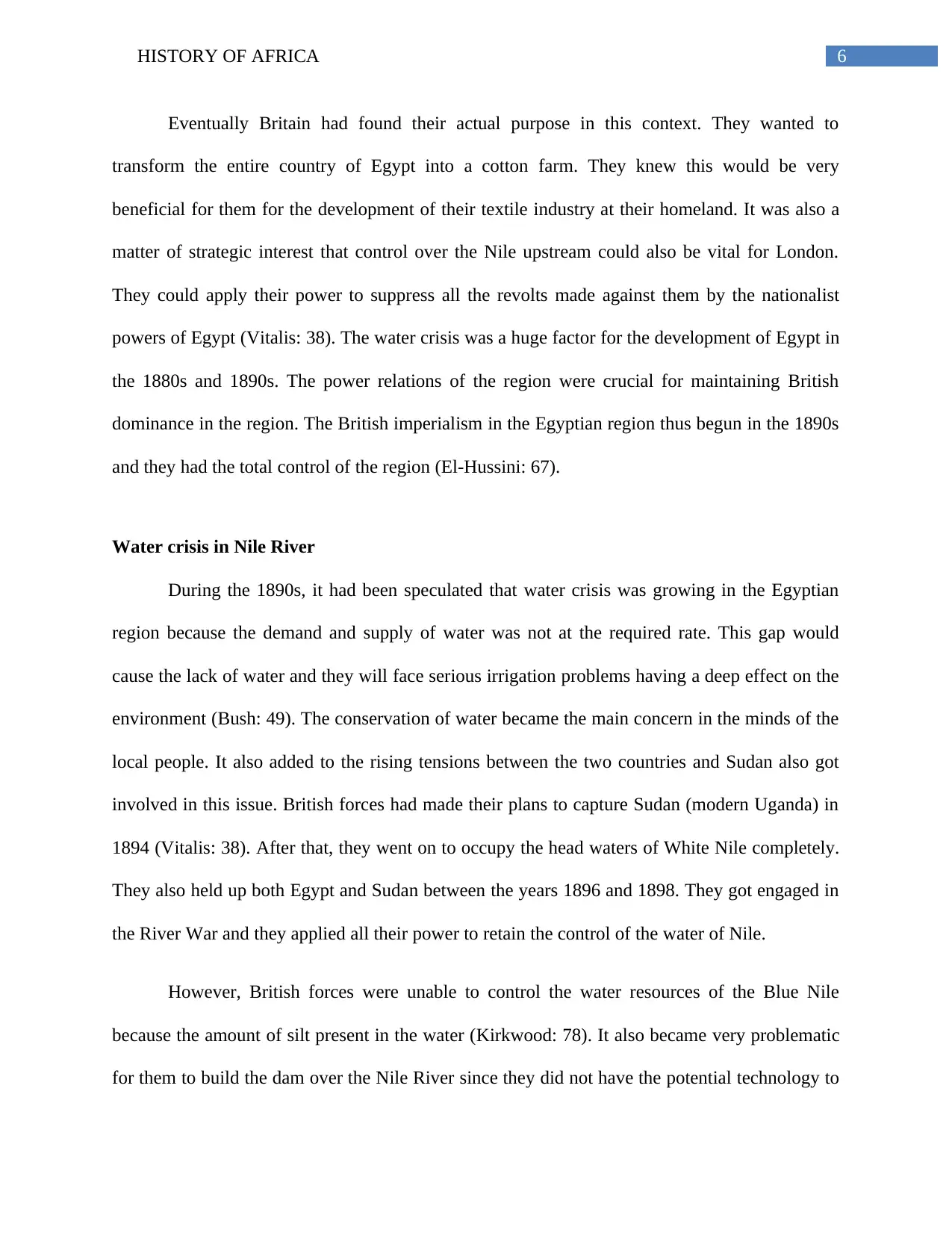
6HISTORY OF AFRICA
Eventually Britain had found their actual purpose in this context. They wanted to
transform the entire country of Egypt into a cotton farm. They knew this would be very
beneficial for them for the development of their textile industry at their homeland. It was also a
matter of strategic interest that control over the Nile upstream could also be vital for London.
They could apply their power to suppress all the revolts made against them by the nationalist
powers of Egypt (Vitalis: 38). The water crisis was a huge factor for the development of Egypt in
the 1880s and 1890s. The power relations of the region were crucial for maintaining British
dominance in the region. The British imperialism in the Egyptian region thus begun in the 1890s
and they had the total control of the region (El-Hussini: 67).
Water crisis in Nile River
During the 1890s, it had been speculated that water crisis was growing in the Egyptian
region because the demand and supply of water was not at the required rate. This gap would
cause the lack of water and they will face serious irrigation problems having a deep effect on the
environment (Bush: 49). The conservation of water became the main concern in the minds of the
local people. It also added to the rising tensions between the two countries and Sudan also got
involved in this issue. British forces had made their plans to capture Sudan (modern Uganda) in
1894 (Vitalis: 38). After that, they went on to occupy the head waters of White Nile completely.
They also held up both Egypt and Sudan between the years 1896 and 1898. They got engaged in
the River War and they applied all their power to retain the control of the water of Nile.
However, British forces were unable to control the water resources of the Blue Nile
because the amount of silt present in the water (Kirkwood: 78). It also became very problematic
for them to build the dam over the Nile River since they did not have the potential technology to
Eventually Britain had found their actual purpose in this context. They wanted to
transform the entire country of Egypt into a cotton farm. They knew this would be very
beneficial for them for the development of their textile industry at their homeland. It was also a
matter of strategic interest that control over the Nile upstream could also be vital for London.
They could apply their power to suppress all the revolts made against them by the nationalist
powers of Egypt (Vitalis: 38). The water crisis was a huge factor for the development of Egypt in
the 1880s and 1890s. The power relations of the region were crucial for maintaining British
dominance in the region. The British imperialism in the Egyptian region thus begun in the 1890s
and they had the total control of the region (El-Hussini: 67).
Water crisis in Nile River
During the 1890s, it had been speculated that water crisis was growing in the Egyptian
region because the demand and supply of water was not at the required rate. This gap would
cause the lack of water and they will face serious irrigation problems having a deep effect on the
environment (Bush: 49). The conservation of water became the main concern in the minds of the
local people. It also added to the rising tensions between the two countries and Sudan also got
involved in this issue. British forces had made their plans to capture Sudan (modern Uganda) in
1894 (Vitalis: 38). After that, they went on to occupy the head waters of White Nile completely.
They also held up both Egypt and Sudan between the years 1896 and 1898. They got engaged in
the River War and they applied all their power to retain the control of the water of Nile.
However, British forces were unable to control the water resources of the Blue Nile
because the amount of silt present in the water (Kirkwood: 78). It also became very problematic
for them to build the dam over the Nile River since they did not have the potential technology to
Paraphrase This Document
Need a fresh take? Get an instant paraphrase of this document with our AI Paraphraser
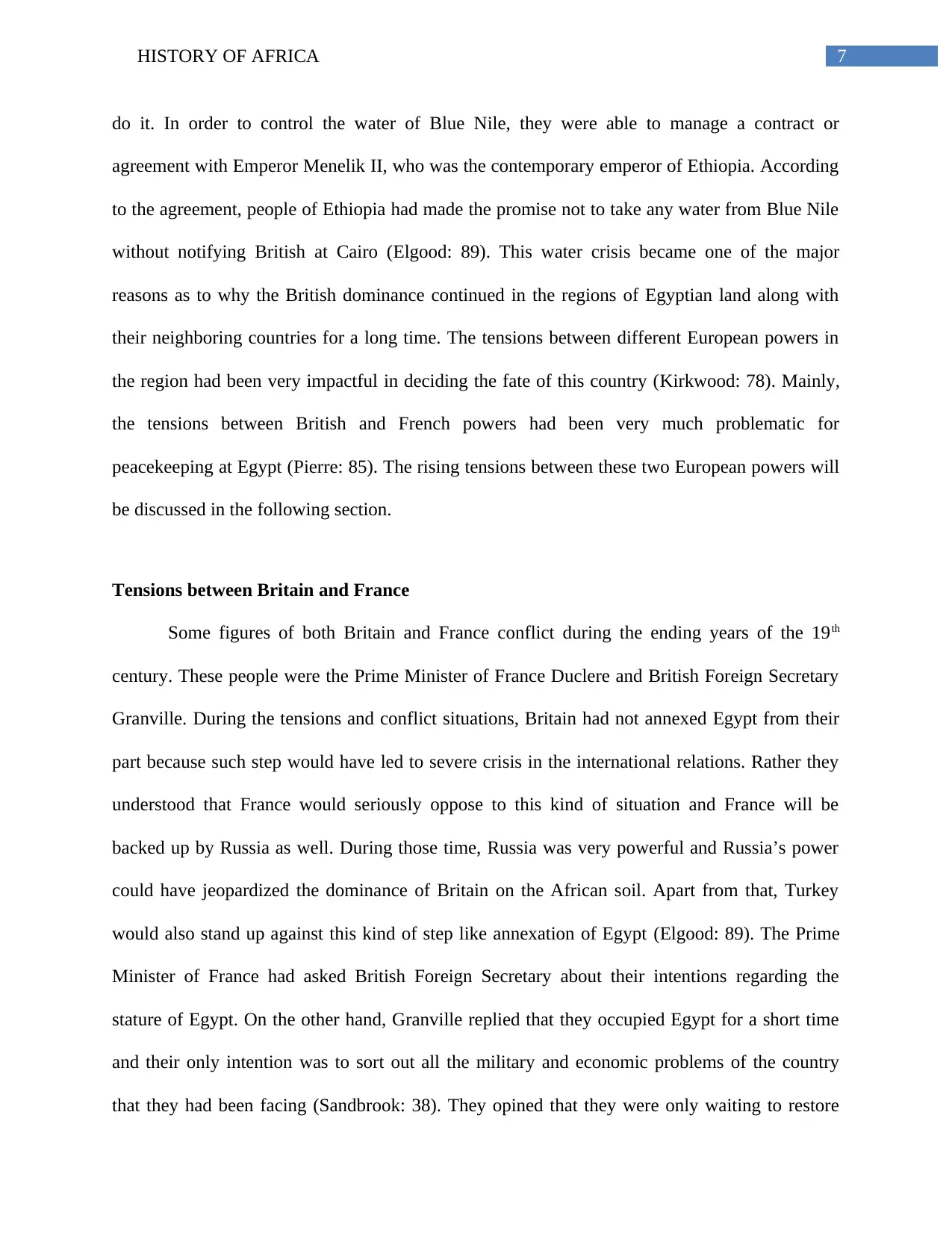
7HISTORY OF AFRICA
do it. In order to control the water of Blue Nile, they were able to manage a contract or
agreement with Emperor Menelik II, who was the contemporary emperor of Ethiopia. According
to the agreement, people of Ethiopia had made the promise not to take any water from Blue Nile
without notifying British at Cairo (Elgood: 89). This water crisis became one of the major
reasons as to why the British dominance continued in the regions of Egyptian land along with
their neighboring countries for a long time. The tensions between different European powers in
the region had been very impactful in deciding the fate of this country (Kirkwood: 78). Mainly,
the tensions between British and French powers had been very much problematic for
peacekeeping at Egypt (Pierre: 85). The rising tensions between these two European powers will
be discussed in the following section.
Tensions between Britain and France
Some figures of both Britain and France conflict during the ending years of the 19th
century. These people were the Prime Minister of France Duclere and British Foreign Secretary
Granville. During the tensions and conflict situations, Britain had not annexed Egypt from their
part because such step would have led to severe crisis in the international relations. Rather they
understood that France would seriously oppose to this kind of situation and France will be
backed up by Russia as well. During those time, Russia was very powerful and Russia’s power
could have jeopardized the dominance of Britain on the African soil. Apart from that, Turkey
would also stand up against this kind of step like annexation of Egypt (Elgood: 89). The Prime
Minister of France had asked British Foreign Secretary about their intentions regarding the
stature of Egypt. On the other hand, Granville replied that they occupied Egypt for a short time
and their only intention was to sort out all the military and economic problems of the country
that they had been facing (Sandbrook: 38). They opined that they were only waiting to restore
do it. In order to control the water of Blue Nile, they were able to manage a contract or
agreement with Emperor Menelik II, who was the contemporary emperor of Ethiopia. According
to the agreement, people of Ethiopia had made the promise not to take any water from Blue Nile
without notifying British at Cairo (Elgood: 89). This water crisis became one of the major
reasons as to why the British dominance continued in the regions of Egyptian land along with
their neighboring countries for a long time. The tensions between different European powers in
the region had been very impactful in deciding the fate of this country (Kirkwood: 78). Mainly,
the tensions between British and French powers had been very much problematic for
peacekeeping at Egypt (Pierre: 85). The rising tensions between these two European powers will
be discussed in the following section.
Tensions between Britain and France
Some figures of both Britain and France conflict during the ending years of the 19th
century. These people were the Prime Minister of France Duclere and British Foreign Secretary
Granville. During the tensions and conflict situations, Britain had not annexed Egypt from their
part because such step would have led to severe crisis in the international relations. Rather they
understood that France would seriously oppose to this kind of situation and France will be
backed up by Russia as well. During those time, Russia was very powerful and Russia’s power
could have jeopardized the dominance of Britain on the African soil. Apart from that, Turkey
would also stand up against this kind of step like annexation of Egypt (Elgood: 89). The Prime
Minister of France had asked British Foreign Secretary about their intentions regarding the
stature of Egypt. On the other hand, Granville replied that they occupied Egypt for a short time
and their only intention was to sort out all the military and economic problems of the country
that they had been facing (Sandbrook: 38). They opined that they were only waiting to restore
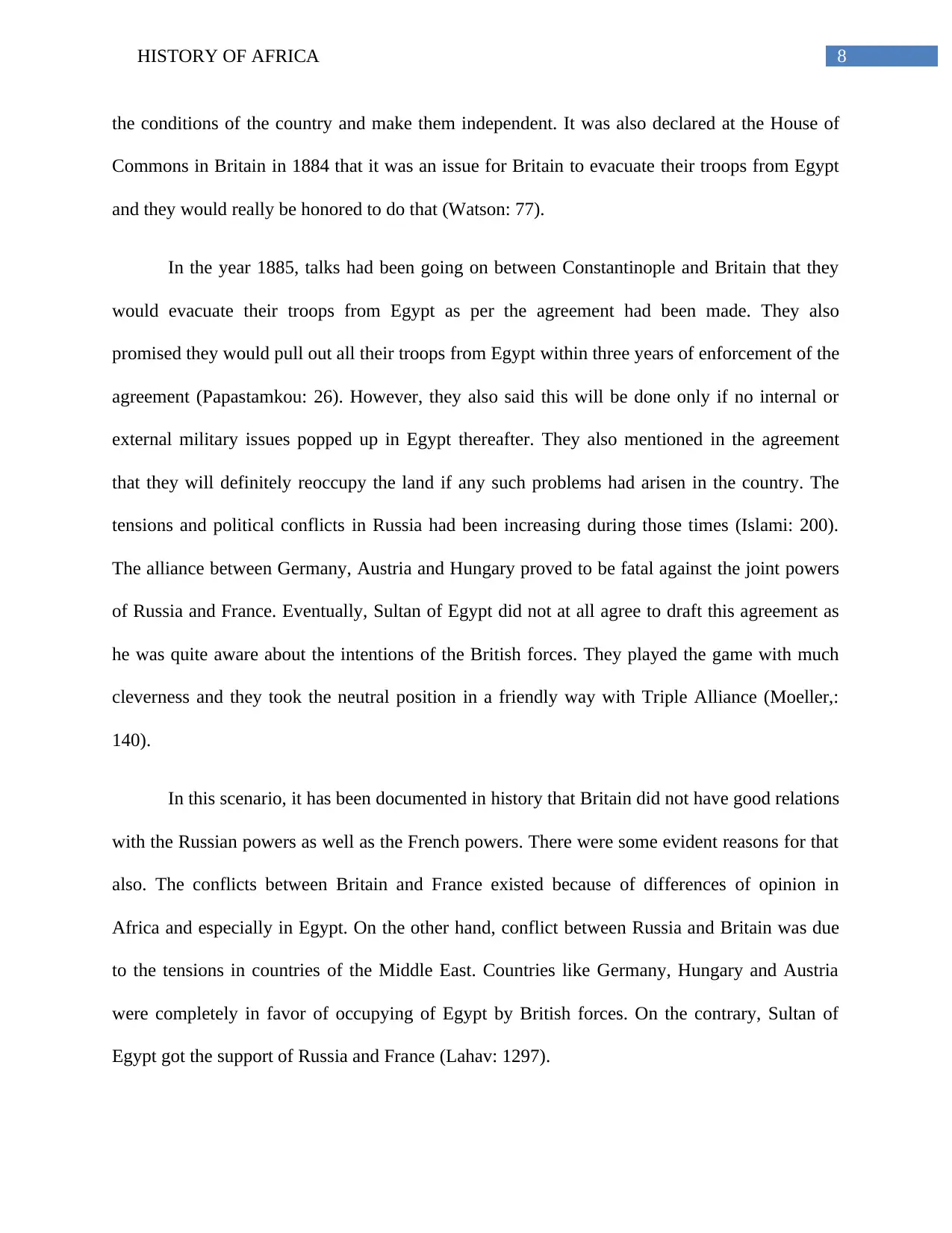
8HISTORY OF AFRICA
the conditions of the country and make them independent. It was also declared at the House of
Commons in Britain in 1884 that it was an issue for Britain to evacuate their troops from Egypt
and they would really be honored to do that (Watson: 77).
In the year 1885, talks had been going on between Constantinople and Britain that they
would evacuate their troops from Egypt as per the agreement had been made. They also
promised they would pull out all their troops from Egypt within three years of enforcement of the
agreement (Papastamkou: 26). However, they also said this will be done only if no internal or
external military issues popped up in Egypt thereafter. They also mentioned in the agreement
that they will definitely reoccupy the land if any such problems had arisen in the country. The
tensions and political conflicts in Russia had been increasing during those times (Islami: 200).
The alliance between Germany, Austria and Hungary proved to be fatal against the joint powers
of Russia and France. Eventually, Sultan of Egypt did not at all agree to draft this agreement as
he was quite aware about the intentions of the British forces. They played the game with much
cleverness and they took the neutral position in a friendly way with Triple Alliance (Moeller,:
140).
In this scenario, it has been documented in history that Britain did not have good relations
with the Russian powers as well as the French powers. There were some evident reasons for that
also. The conflicts between Britain and France existed because of differences of opinion in
Africa and especially in Egypt. On the other hand, conflict between Russia and Britain was due
to the tensions in countries of the Middle East. Countries like Germany, Hungary and Austria
were completely in favor of occupying of Egypt by British forces. On the contrary, Sultan of
Egypt got the support of Russia and France (Lahav: 1297).
the conditions of the country and make them independent. It was also declared at the House of
Commons in Britain in 1884 that it was an issue for Britain to evacuate their troops from Egypt
and they would really be honored to do that (Watson: 77).
In the year 1885, talks had been going on between Constantinople and Britain that they
would evacuate their troops from Egypt as per the agreement had been made. They also
promised they would pull out all their troops from Egypt within three years of enforcement of the
agreement (Papastamkou: 26). However, they also said this will be done only if no internal or
external military issues popped up in Egypt thereafter. They also mentioned in the agreement
that they will definitely reoccupy the land if any such problems had arisen in the country. The
tensions and political conflicts in Russia had been increasing during those times (Islami: 200).
The alliance between Germany, Austria and Hungary proved to be fatal against the joint powers
of Russia and France. Eventually, Sultan of Egypt did not at all agree to draft this agreement as
he was quite aware about the intentions of the British forces. They played the game with much
cleverness and they took the neutral position in a friendly way with Triple Alliance (Moeller,:
140).
In this scenario, it has been documented in history that Britain did not have good relations
with the Russian powers as well as the French powers. There were some evident reasons for that
also. The conflicts between Britain and France existed because of differences of opinion in
Africa and especially in Egypt. On the other hand, conflict between Russia and Britain was due
to the tensions in countries of the Middle East. Countries like Germany, Hungary and Austria
were completely in favor of occupying of Egypt by British forces. On the contrary, Sultan of
Egypt got the support of Russia and France (Lahav: 1297).
⊘ This is a preview!⊘
Do you want full access?
Subscribe today to unlock all pages.

Trusted by 1+ million students worldwide
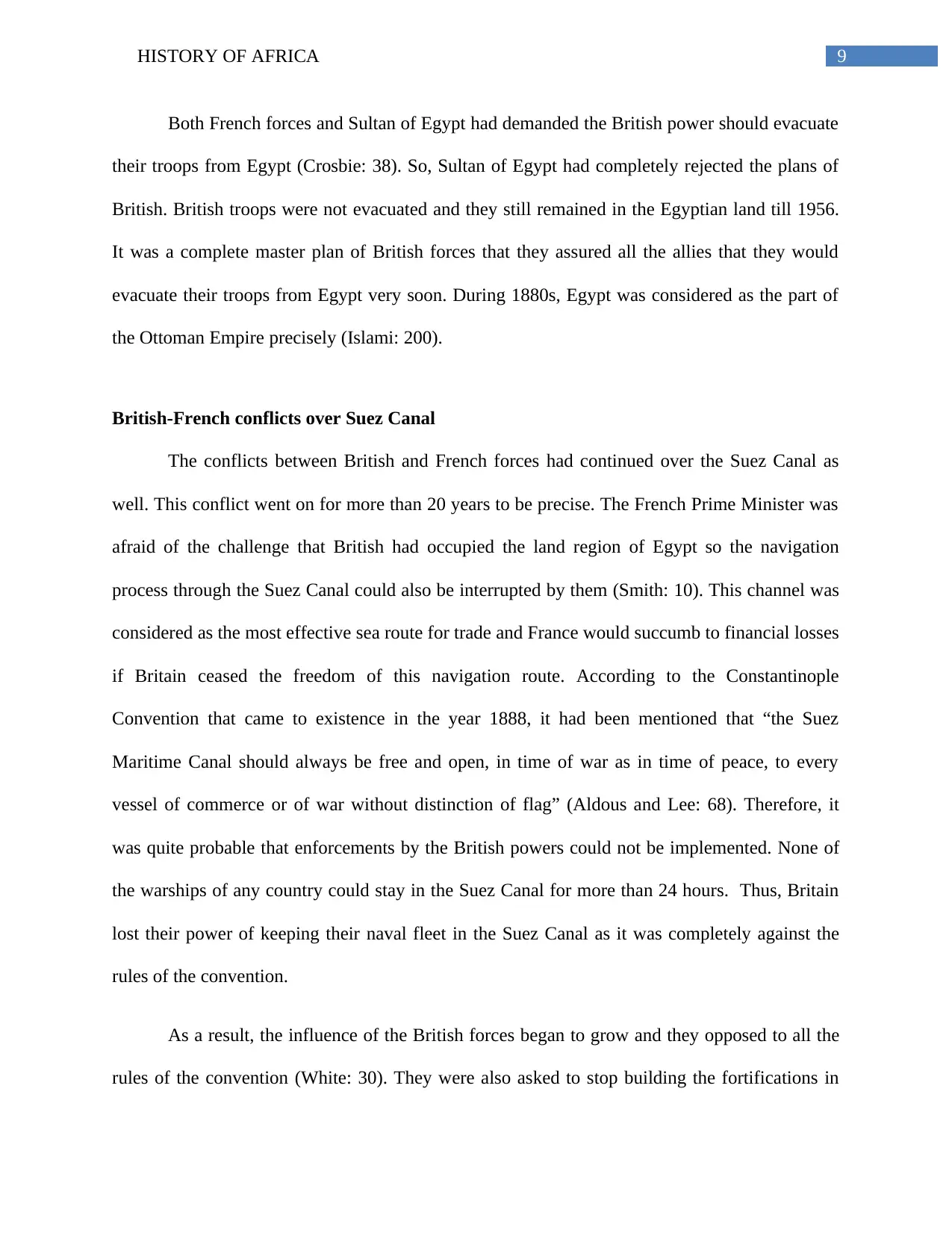
9HISTORY OF AFRICA
Both French forces and Sultan of Egypt had demanded the British power should evacuate
their troops from Egypt (Crosbie: 38). So, Sultan of Egypt had completely rejected the plans of
British. British troops were not evacuated and they still remained in the Egyptian land till 1956.
It was a complete master plan of British forces that they assured all the allies that they would
evacuate their troops from Egypt very soon. During 1880s, Egypt was considered as the part of
the Ottoman Empire precisely (Islami: 200).
British-French conflicts over Suez Canal
The conflicts between British and French forces had continued over the Suez Canal as
well. This conflict went on for more than 20 years to be precise. The French Prime Minister was
afraid of the challenge that British had occupied the land region of Egypt so the navigation
process through the Suez Canal could also be interrupted by them (Smith: 10). This channel was
considered as the most effective sea route for trade and France would succumb to financial losses
if Britain ceased the freedom of this navigation route. According to the Constantinople
Convention that came to existence in the year 1888, it had been mentioned that “the Suez
Maritime Canal should always be free and open, in time of war as in time of peace, to every
vessel of commerce or of war without distinction of flag” (Aldous and Lee: 68). Therefore, it
was quite probable that enforcements by the British powers could not be implemented. None of
the warships of any country could stay in the Suez Canal for more than 24 hours. Thus, Britain
lost their power of keeping their naval fleet in the Suez Canal as it was completely against the
rules of the convention.
As a result, the influence of the British forces began to grow and they opposed to all the
rules of the convention (White: 30). They were also asked to stop building the fortifications in
Both French forces and Sultan of Egypt had demanded the British power should evacuate
their troops from Egypt (Crosbie: 38). So, Sultan of Egypt had completely rejected the plans of
British. British troops were not evacuated and they still remained in the Egyptian land till 1956.
It was a complete master plan of British forces that they assured all the allies that they would
evacuate their troops from Egypt very soon. During 1880s, Egypt was considered as the part of
the Ottoman Empire precisely (Islami: 200).
British-French conflicts over Suez Canal
The conflicts between British and French forces had continued over the Suez Canal as
well. This conflict went on for more than 20 years to be precise. The French Prime Minister was
afraid of the challenge that British had occupied the land region of Egypt so the navigation
process through the Suez Canal could also be interrupted by them (Smith: 10). This channel was
considered as the most effective sea route for trade and France would succumb to financial losses
if Britain ceased the freedom of this navigation route. According to the Constantinople
Convention that came to existence in the year 1888, it had been mentioned that “the Suez
Maritime Canal should always be free and open, in time of war as in time of peace, to every
vessel of commerce or of war without distinction of flag” (Aldous and Lee: 68). Therefore, it
was quite probable that enforcements by the British powers could not be implemented. None of
the warships of any country could stay in the Suez Canal for more than 24 hours. Thus, Britain
lost their power of keeping their naval fleet in the Suez Canal as it was completely against the
rules of the convention.
As a result, the influence of the British forces began to grow and they opposed to all the
rules of the convention (White: 30). They were also asked to stop building the fortifications in
Paraphrase This Document
Need a fresh take? Get an instant paraphrase of this document with our AI Paraphraser
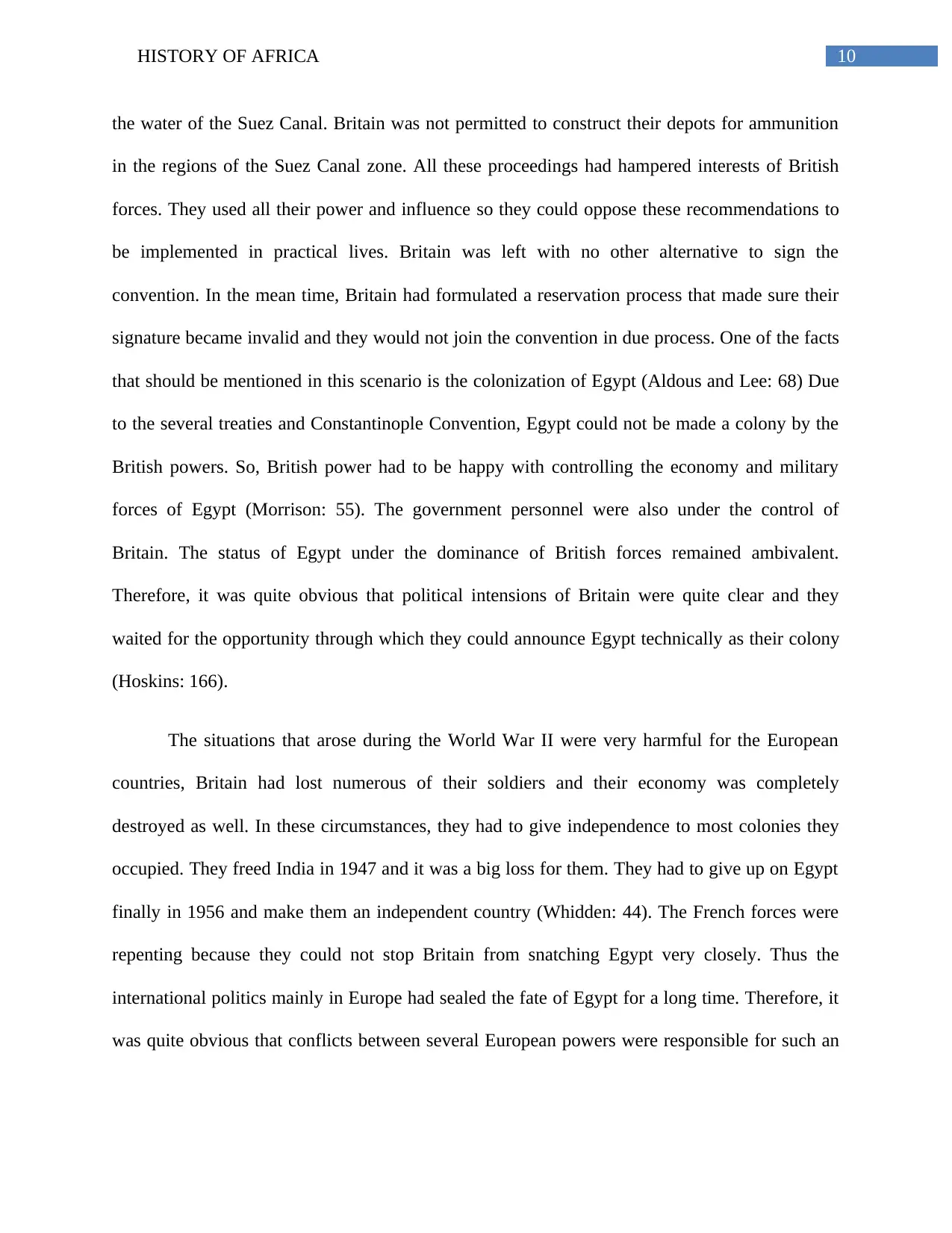
10HISTORY OF AFRICA
the water of the Suez Canal. Britain was not permitted to construct their depots for ammunition
in the regions of the Suez Canal zone. All these proceedings had hampered interests of British
forces. They used all their power and influence so they could oppose these recommendations to
be implemented in practical lives. Britain was left with no other alternative to sign the
convention. In the mean time, Britain had formulated a reservation process that made sure their
signature became invalid and they would not join the convention in due process. One of the facts
that should be mentioned in this scenario is the colonization of Egypt (Aldous and Lee: 68) Due
to the several treaties and Constantinople Convention, Egypt could not be made a colony by the
British powers. So, British power had to be happy with controlling the economy and military
forces of Egypt (Morrison: 55). The government personnel were also under the control of
Britain. The status of Egypt under the dominance of British forces remained ambivalent.
Therefore, it was quite obvious that political intensions of Britain were quite clear and they
waited for the opportunity through which they could announce Egypt technically as their colony
(Hoskins: 166).
The situations that arose during the World War II were very harmful for the European
countries, Britain had lost numerous of their soldiers and their economy was completely
destroyed as well. In these circumstances, they had to give independence to most colonies they
occupied. They freed India in 1947 and it was a big loss for them. They had to give up on Egypt
finally in 1956 and make them an independent country (Whidden: 44). The French forces were
repenting because they could not stop Britain from snatching Egypt very closely. Thus the
international politics mainly in Europe had sealed the fate of Egypt for a long time. Therefore, it
was quite obvious that conflicts between several European powers were responsible for such an
the water of the Suez Canal. Britain was not permitted to construct their depots for ammunition
in the regions of the Suez Canal zone. All these proceedings had hampered interests of British
forces. They used all their power and influence so they could oppose these recommendations to
be implemented in practical lives. Britain was left with no other alternative to sign the
convention. In the mean time, Britain had formulated a reservation process that made sure their
signature became invalid and they would not join the convention in due process. One of the facts
that should be mentioned in this scenario is the colonization of Egypt (Aldous and Lee: 68) Due
to the several treaties and Constantinople Convention, Egypt could not be made a colony by the
British powers. So, British power had to be happy with controlling the economy and military
forces of Egypt (Morrison: 55). The government personnel were also under the control of
Britain. The status of Egypt under the dominance of British forces remained ambivalent.
Therefore, it was quite obvious that political intensions of Britain were quite clear and they
waited for the opportunity through which they could announce Egypt technically as their colony
(Hoskins: 166).
The situations that arose during the World War II were very harmful for the European
countries, Britain had lost numerous of their soldiers and their economy was completely
destroyed as well. In these circumstances, they had to give independence to most colonies they
occupied. They freed India in 1947 and it was a big loss for them. They had to give up on Egypt
finally in 1956 and make them an independent country (Whidden: 44). The French forces were
repenting because they could not stop Britain from snatching Egypt very closely. Thus the
international politics mainly in Europe had sealed the fate of Egypt for a long time. Therefore, it
was quite obvious that conflicts between several European powers were responsible for such an
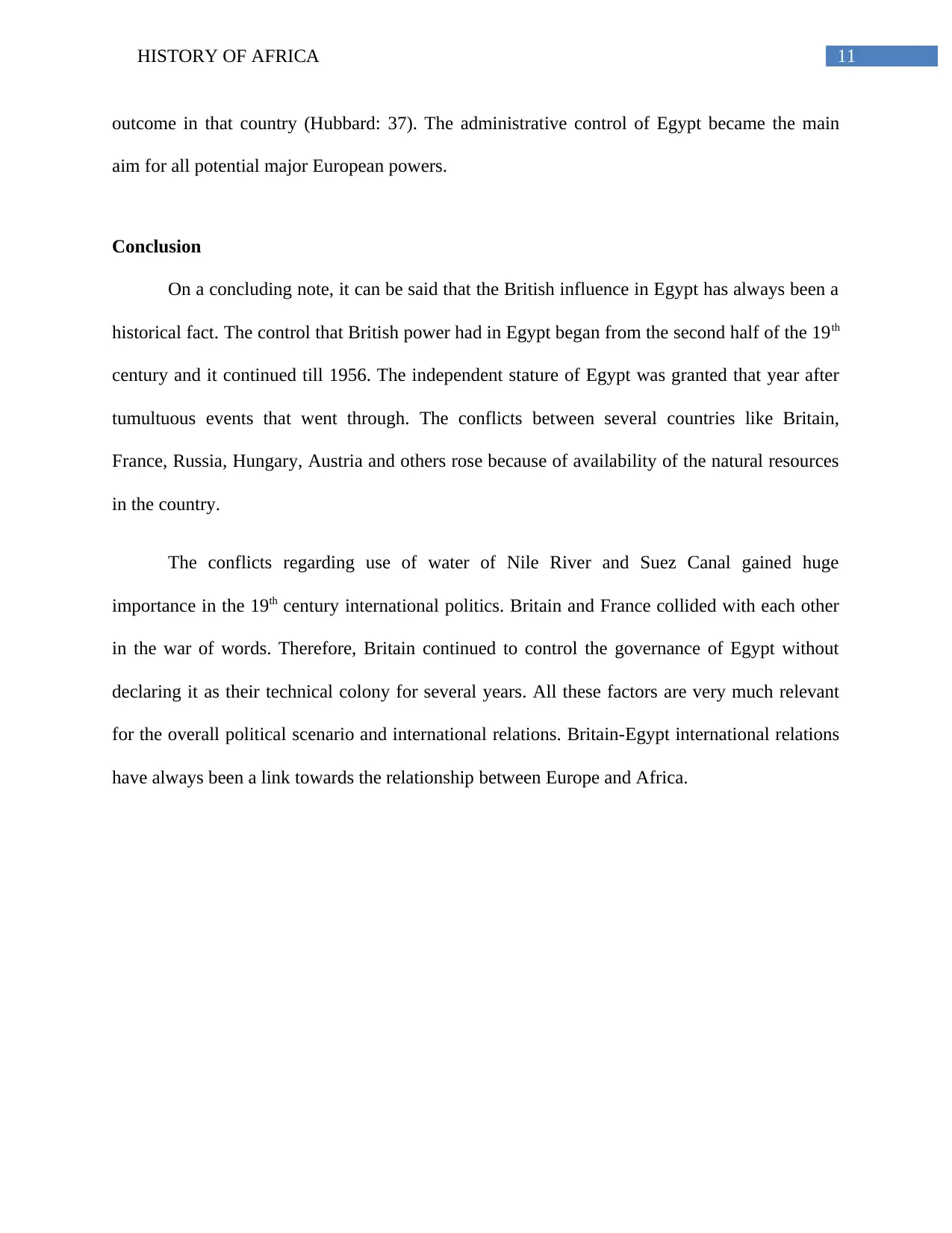
11HISTORY OF AFRICA
outcome in that country (Hubbard: 37). The administrative control of Egypt became the main
aim for all potential major European powers.
Conclusion
On a concluding note, it can be said that the British influence in Egypt has always been a
historical fact. The control that British power had in Egypt began from the second half of the 19th
century and it continued till 1956. The independent stature of Egypt was granted that year after
tumultuous events that went through. The conflicts between several countries like Britain,
France, Russia, Hungary, Austria and others rose because of availability of the natural resources
in the country.
The conflicts regarding use of water of Nile River and Suez Canal gained huge
importance in the 19th century international politics. Britain and France collided with each other
in the war of words. Therefore, Britain continued to control the governance of Egypt without
declaring it as their technical colony for several years. All these factors are very much relevant
for the overall political scenario and international relations. Britain-Egypt international relations
have always been a link towards the relationship between Europe and Africa.
outcome in that country (Hubbard: 37). The administrative control of Egypt became the main
aim for all potential major European powers.
Conclusion
On a concluding note, it can be said that the British influence in Egypt has always been a
historical fact. The control that British power had in Egypt began from the second half of the 19th
century and it continued till 1956. The independent stature of Egypt was granted that year after
tumultuous events that went through. The conflicts between several countries like Britain,
France, Russia, Hungary, Austria and others rose because of availability of the natural resources
in the country.
The conflicts regarding use of water of Nile River and Suez Canal gained huge
importance in the 19th century international politics. Britain and France collided with each other
in the war of words. Therefore, Britain continued to control the governance of Egypt without
declaring it as their technical colony for several years. All these factors are very much relevant
for the overall political scenario and international relations. Britain-Egypt international relations
have always been a link towards the relationship between Europe and Africa.
⊘ This is a preview!⊘
Do you want full access?
Subscribe today to unlock all pages.

Trusted by 1+ million students worldwide
1 out of 17
Your All-in-One AI-Powered Toolkit for Academic Success.
+13062052269
info@desklib.com
Available 24*7 on WhatsApp / Email
![[object Object]](/_next/static/media/star-bottom.7253800d.svg)
Unlock your academic potential
Copyright © 2020–2026 A2Z Services. All Rights Reserved. Developed and managed by ZUCOL.

